-
Search -
Accessibility -
Members Login








Focus areas
ICVA’s Humanitarian Financing Working Group is a forum for ICVA members to discuss humanitarian financing developments, exchange information, understand NGOs views and concerns, and identify opportunities for collective advocacy.
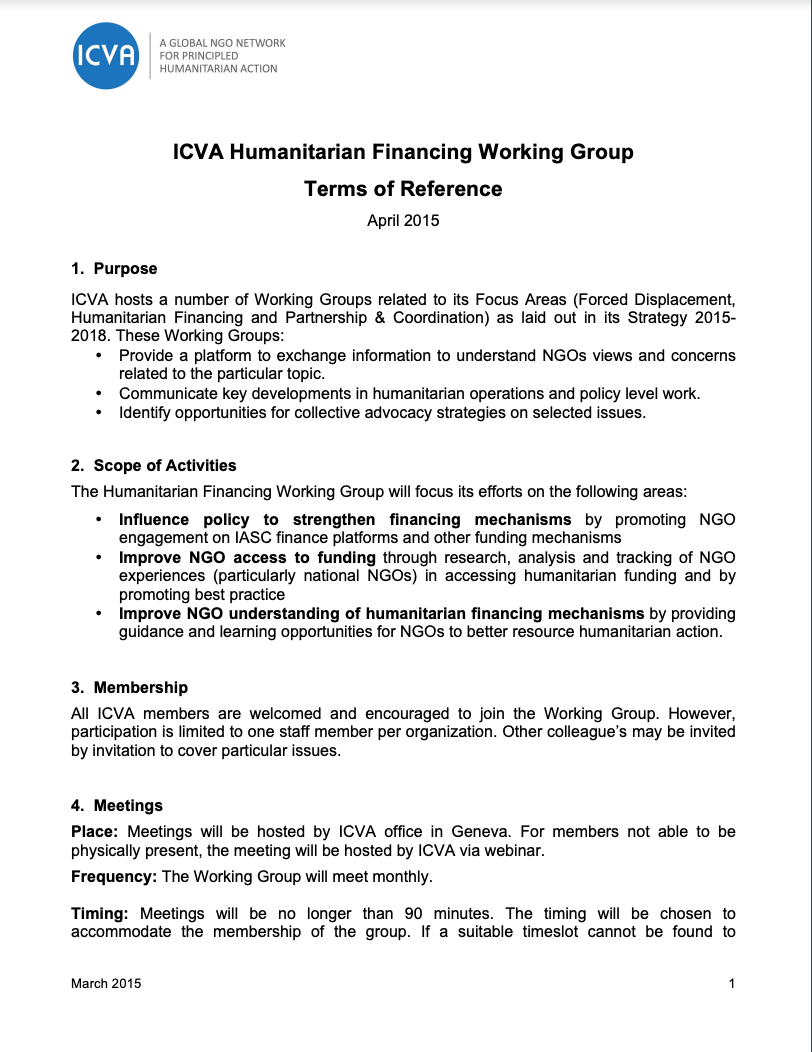
ICVA hosts a number of working groups related to its focus areas (forced migration, financing and coordination) as laid out in ICVA’s Strategy. This is the proposed terms for reference for the ICVA humanitarian financing working group.
Below are notes from the Humanitarian Financing Working Group meetings.
Notes are available for ICVA members only.
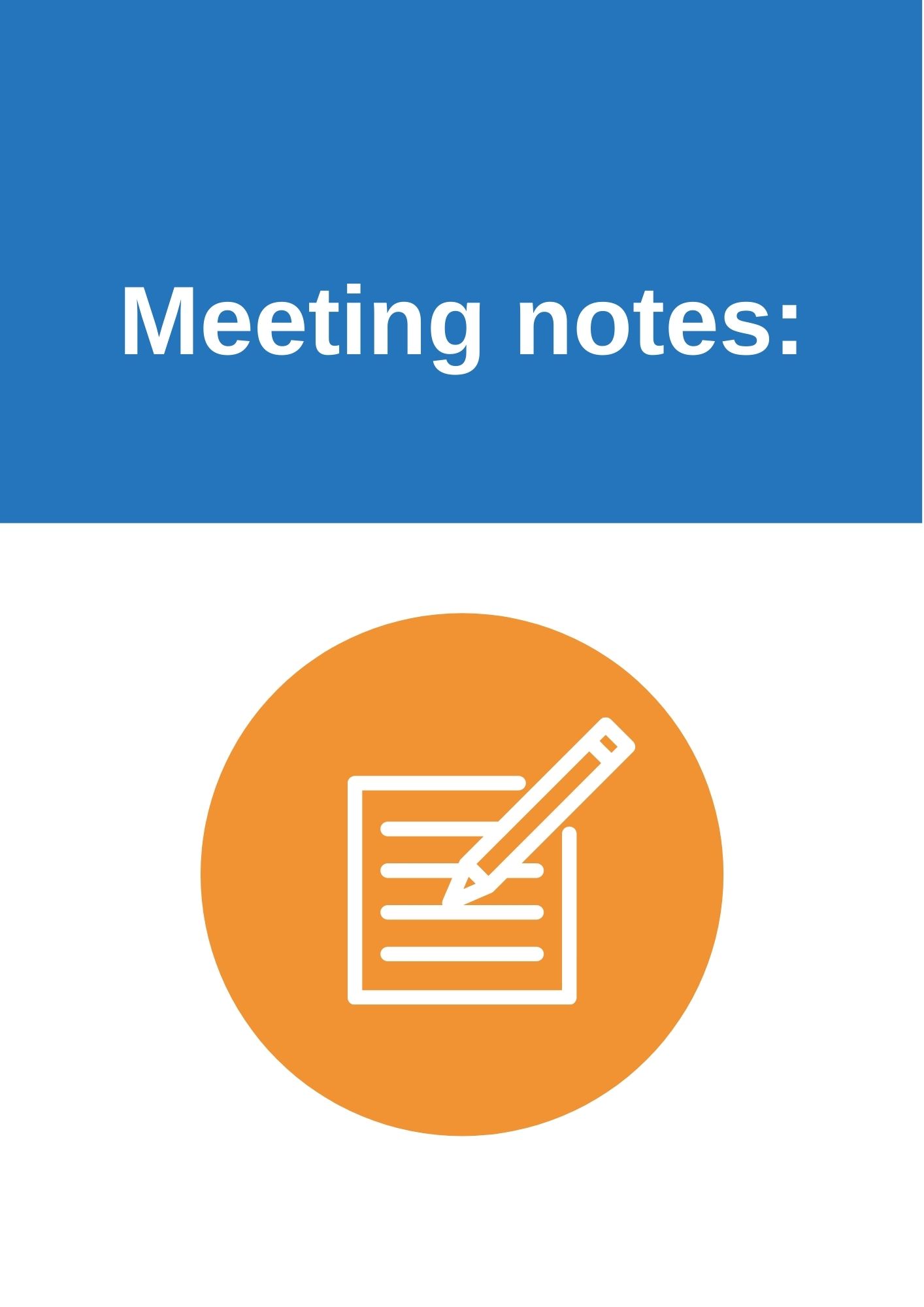


Manon joined ICVA in 2022 as Humanitarian Finance Policy Officer, her work focuses on Quality Funding and Partnerships in addition to other humanitarian finance topics.
Over the past seven years, she has worked with several NGOs in the humanitarian sector in advocacy, policy analysis and research. Prior to joining ICVA, she worked with MSF International as well as country-level NGOs such as Lebanon Support and INSAN in Lebanon.
Manon holds a bachelor’s degree in War Studies and a master’s in International Peace and Security from King’s College London University.
The Less Paper More Aid initiative, carried out by NGOs, aims to reduce the burden of donor conditions on aid agencies and improve the efficiency of humanitarian action. The initiative seeks to highlight the negative implications of excessive donor requirements and provide concrete recommendations to donors on how they can harmonize and simplify reporting procedures.
Major donors have expressed a desire for greater efficiency and are set to discuss a Grand Bargain to embrace best practices and reduce inefficiencies in humanitarian action. The initiative’s approach involves gathering evidence of the impact of donor reporting in the field, including time and cost implications, and identifying key challenges and potential solutions for consideration by donors and NGOs alike.
More information can be found on the Less Paper More Aid Website.
The Grand Bargain, launched during the World Humanitarian Summit in 2016, is a unique agreement between some of the largest donors and humanitarian organisations who have committed to get more means into the hands of people in need and to improve the effectiveness and efficiency of the humanitarian action.
As of February 2021, the signatories of the Grand Bargain endorsed a framework on the future of the Grand Bargain – known as the Grand Bargain 2.0. The Grand Bargain 2.0 reframes the overall objective to achieving “Better humanitarian outcomes for affected populations through enhanced efficiency, effectiveness, and greater accountability” .
In September 2021, ICVA took over the NGO seat in the Grand Bargain Facilitation Group, in addition to a new specific local representation seat taken by NEAR. In June 2023, ICVA released a statement supporting the Grand Bargain’s newly endorsed framework through 2026. The framework provides a solid foundation to work collectively towards a more efficient and effective use of resources to reduce the needs and to deliver the best outcomes for affected populations.
To find out more about the Grand Bargain have a look at the following resources.

On 18 October, ICVA hosted a webinar for its members and NGO Fora in East and Southern Africa on the future of the Grand Bargain beyond 2023. The session also facilitated a discussion among participants to gather their reactions and identify areas of alignment between country-level priorities for humanitarian finance and Grand Bargain implementation, with a specific focus on local actors.
Click on the links below to access the webinar presentation and recording.
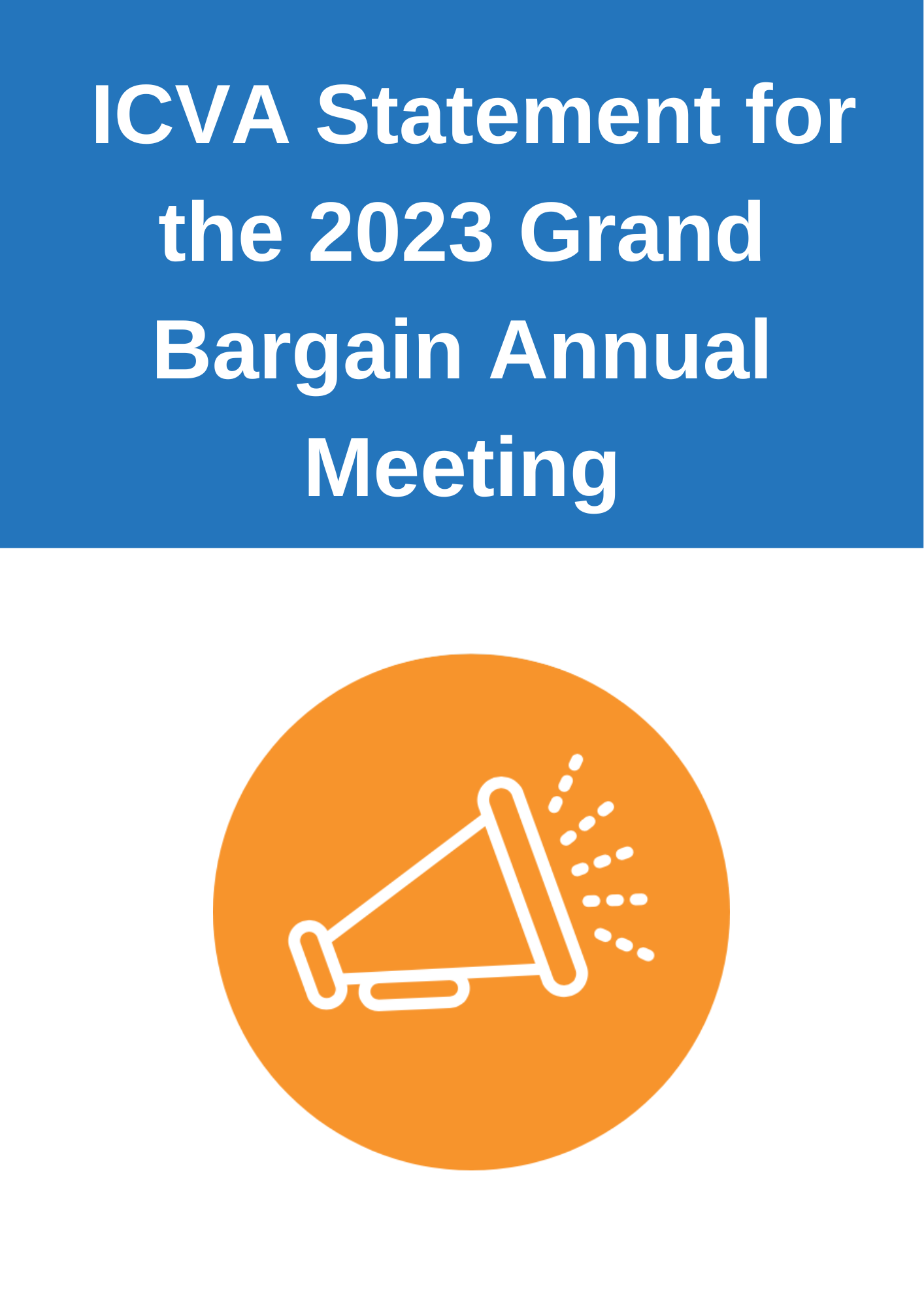
ICVA has released a statement supporting the Grand Bargain’s newly endorsed framework through 2026. The framework provides a solid foundation for effective resource allocation and achieving the best outcomes for populations affected by crisis. ICVA also believes that the Grand Bargain, with its broad membership of donors, UN agencies, NGOs, and Red Cross Red Crescent Movement, is a key platform for pursuing joint efforts in addressing the commitments under the framework. The simplified structure of the new Grand Bargain framework encourages individual signatories to maintain progress towards implementation without further burden. ICVA has identified localisation, partnership, and humanitarian financing as its priorities in alignment with the two agreed focus areas of the Grand Bargain. ICVA believes that successful implementation of the Grand Bargain will result in tangible change for frontline responders and those affected by crisis.
Read the statement in the below link.
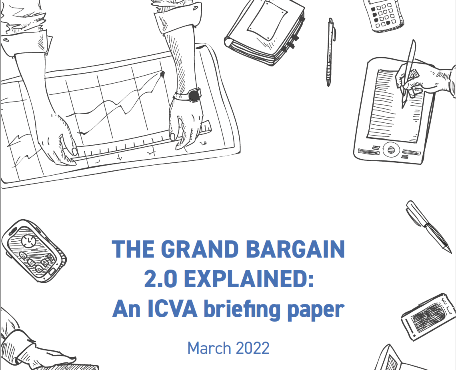
Following the ‘Grand Bargain explained’ paper published in March 2017, ICVA has drafted the ‘Grand Bargain 2.0 explained’ briefing paper to support humanitarian actors, particularly NGOs, to better understand and engage in this new phase of the Grand Bargain 2.0 from 2021 – 2023.
Special thanks to The Amity Foundation for their diligent efforts in translating this essential document into Chinese.
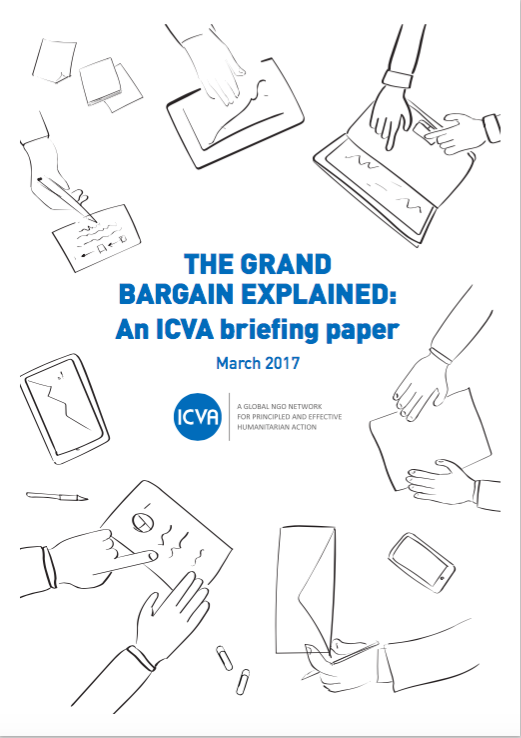
Click on this briefing paper to access all information – and more – shared throughout this topic.
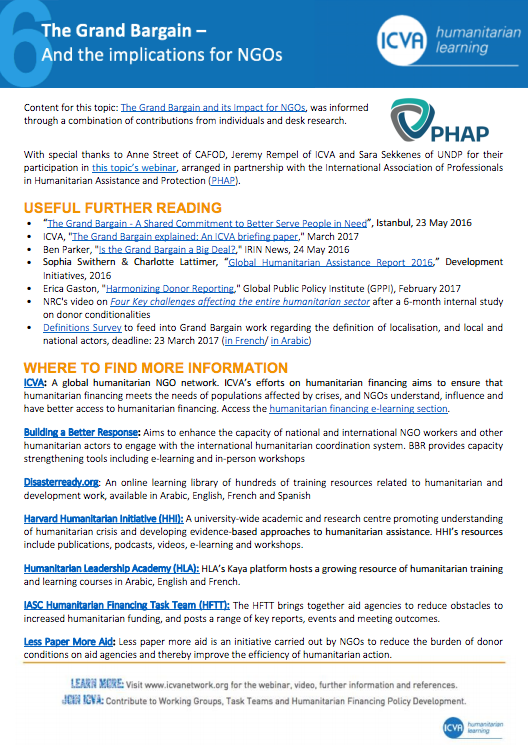
Check out more information discussed throughout this topic.
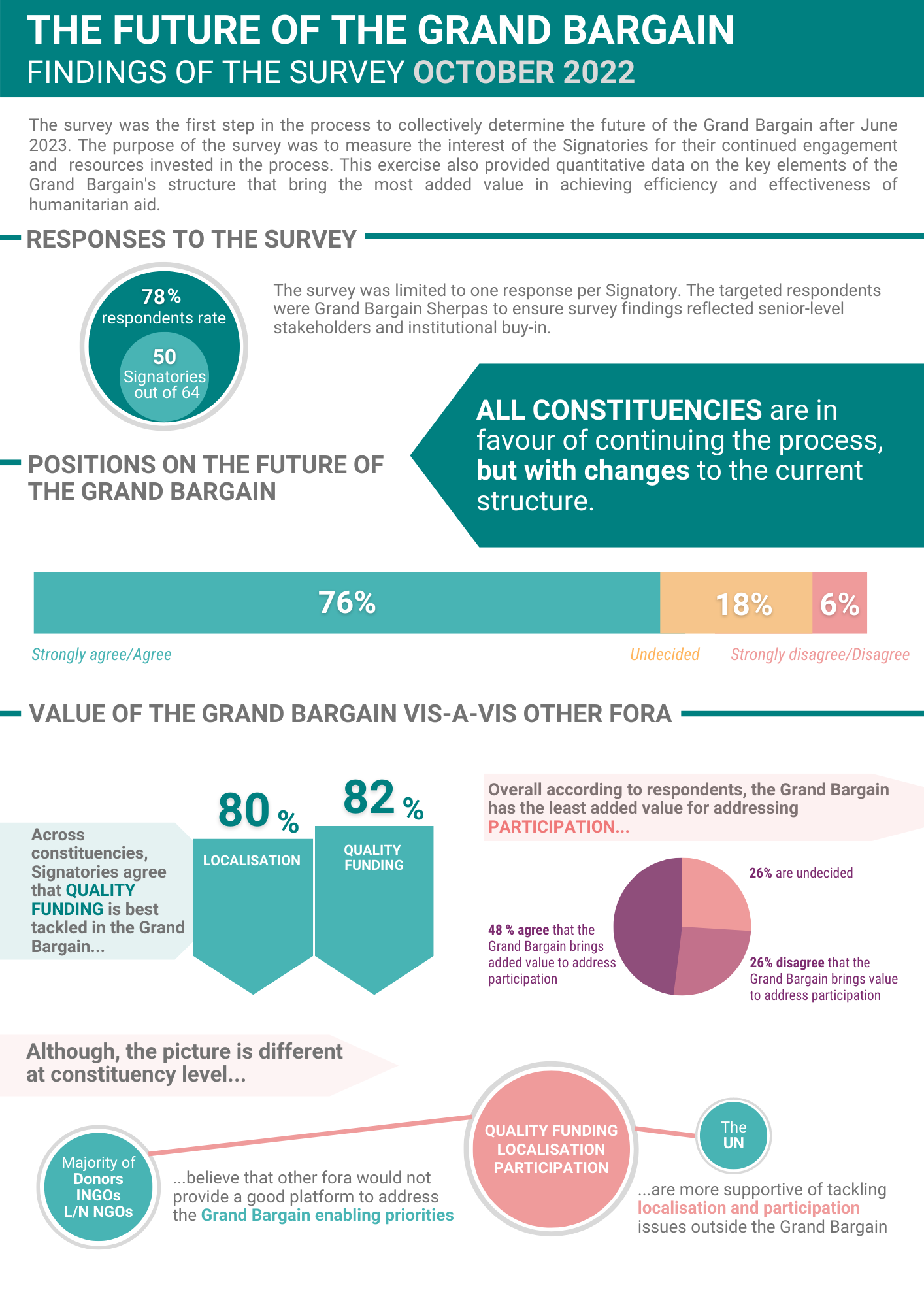
The purpose of the survey was to measure the interest of the Signatories to continue their engagement and invest their internal resources in case of the continuation of the process. This exercise also provided quantitative data on the key elements of the Grand Bargain structure that bring most added value in achieving efficiency and effectiveness of humanitarian aid.
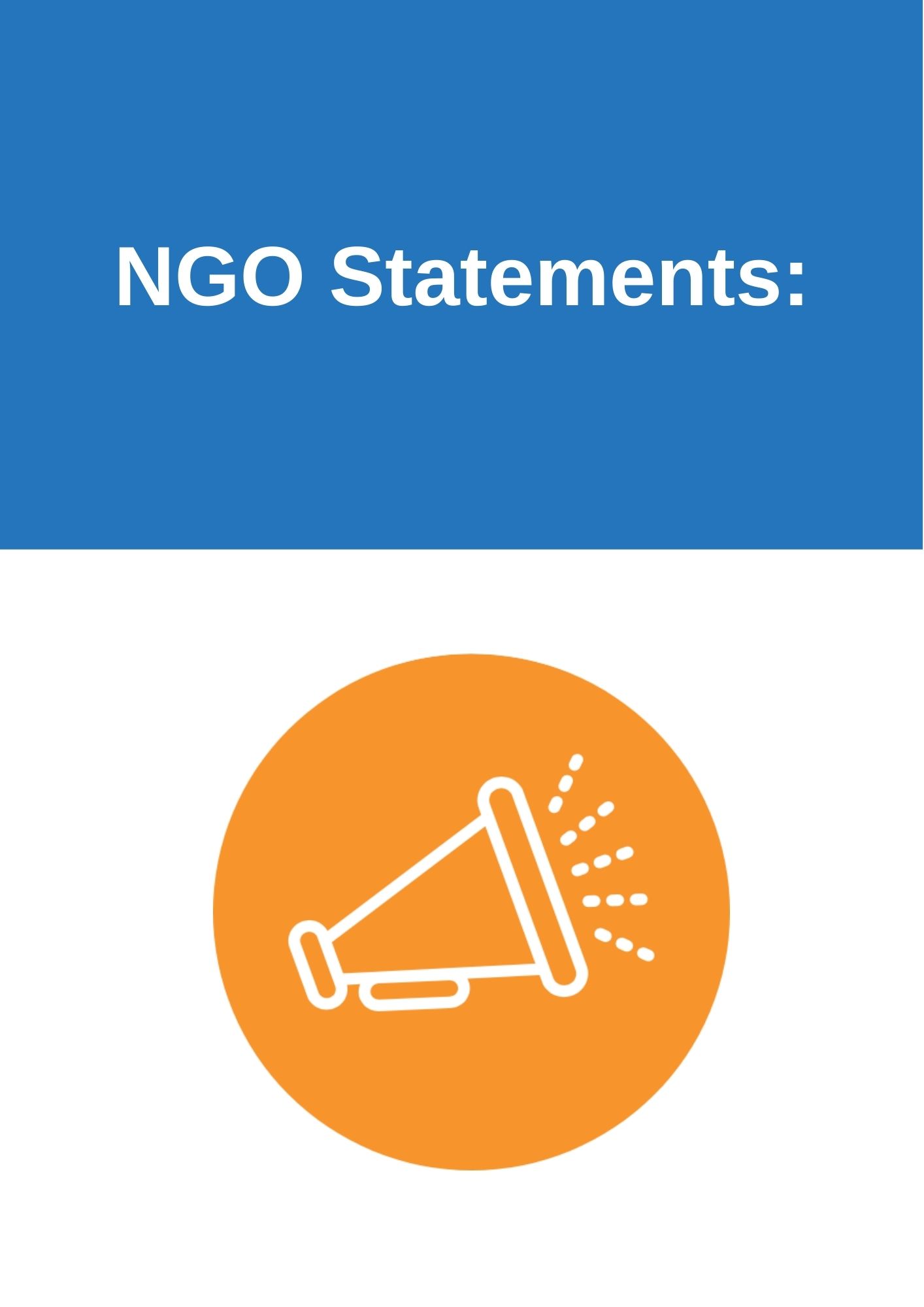
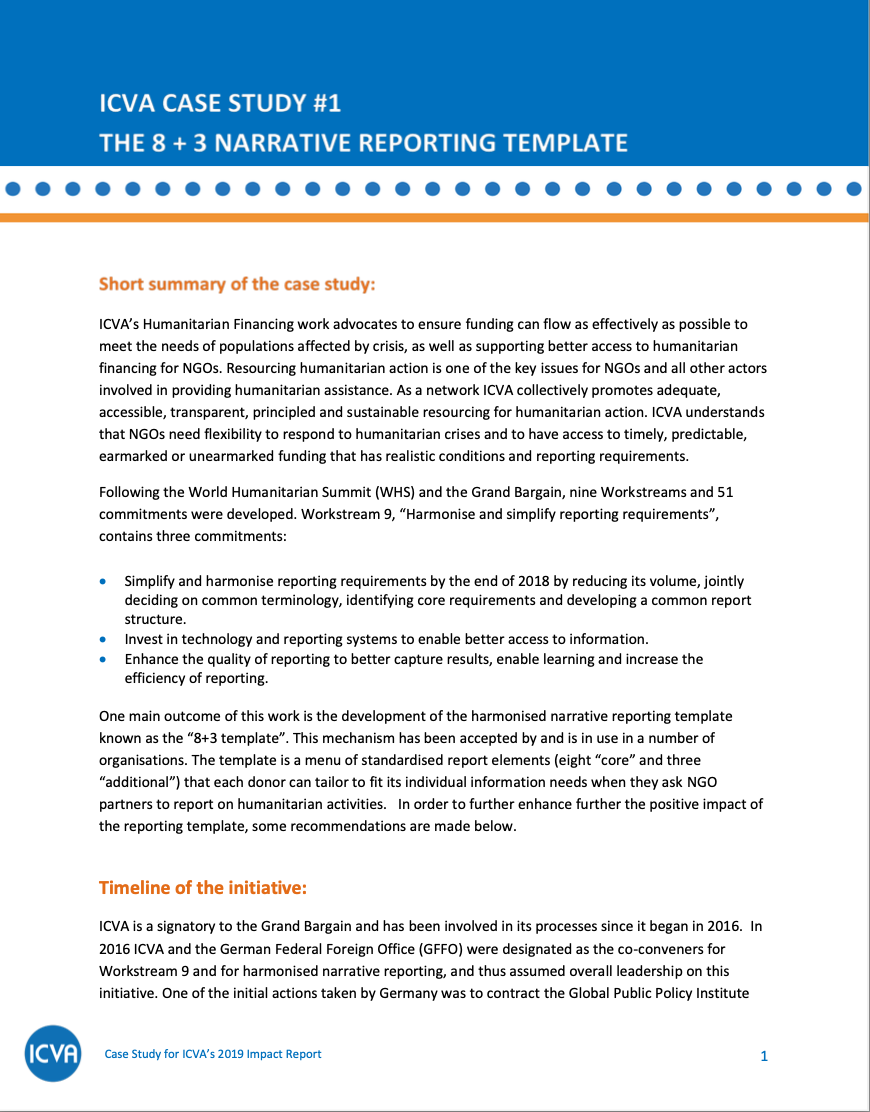
ICVA is currently co-chair of the IASC results group 5 on humanitarian financing.
This group is focused on two strategic priorities:
More information about the Results Group 5 can be found on the IASC website
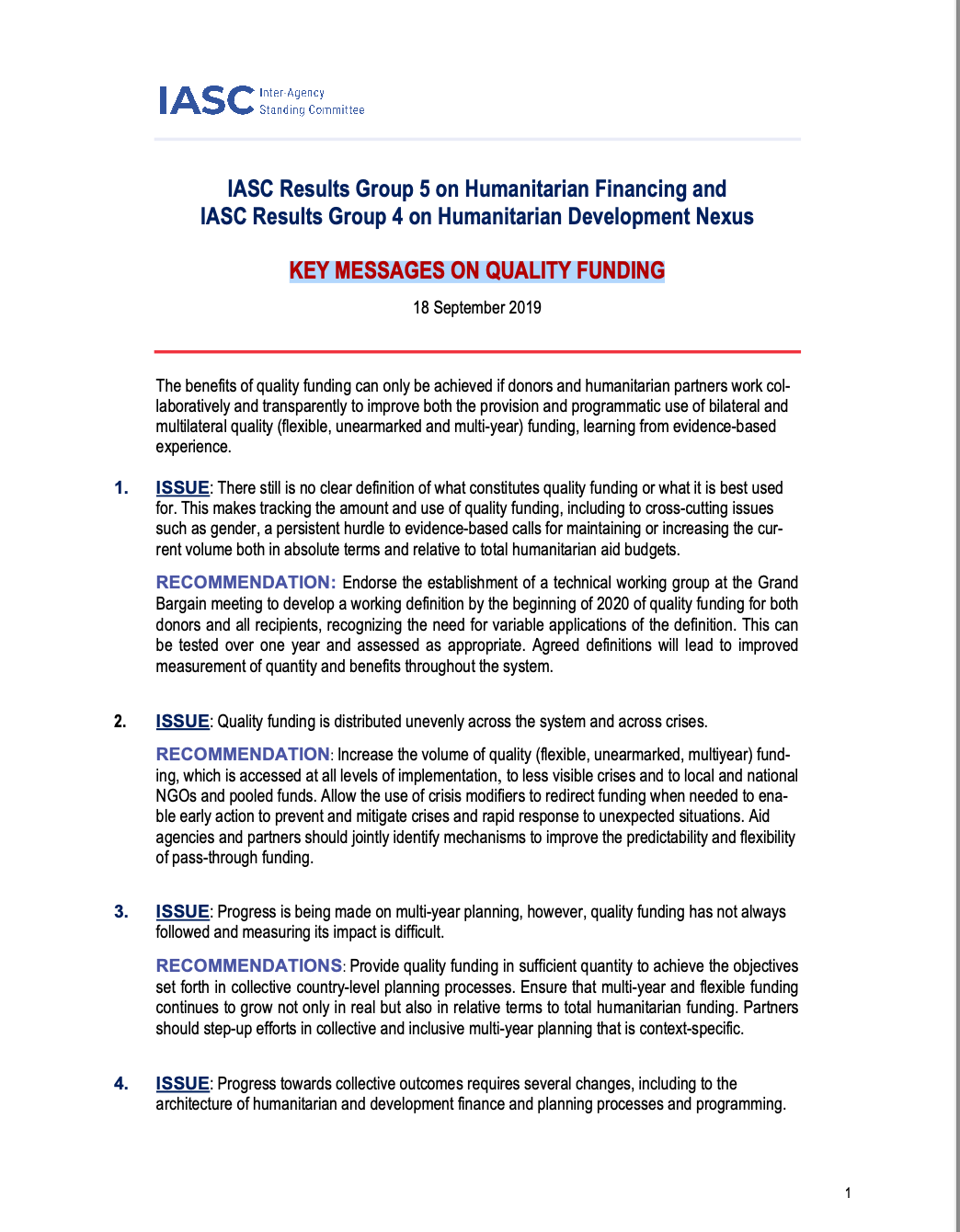
IASC Results group 5 on humanitarian financing and results group 6 on Humanitarian, development and nexus, joint key messages on quality funding.
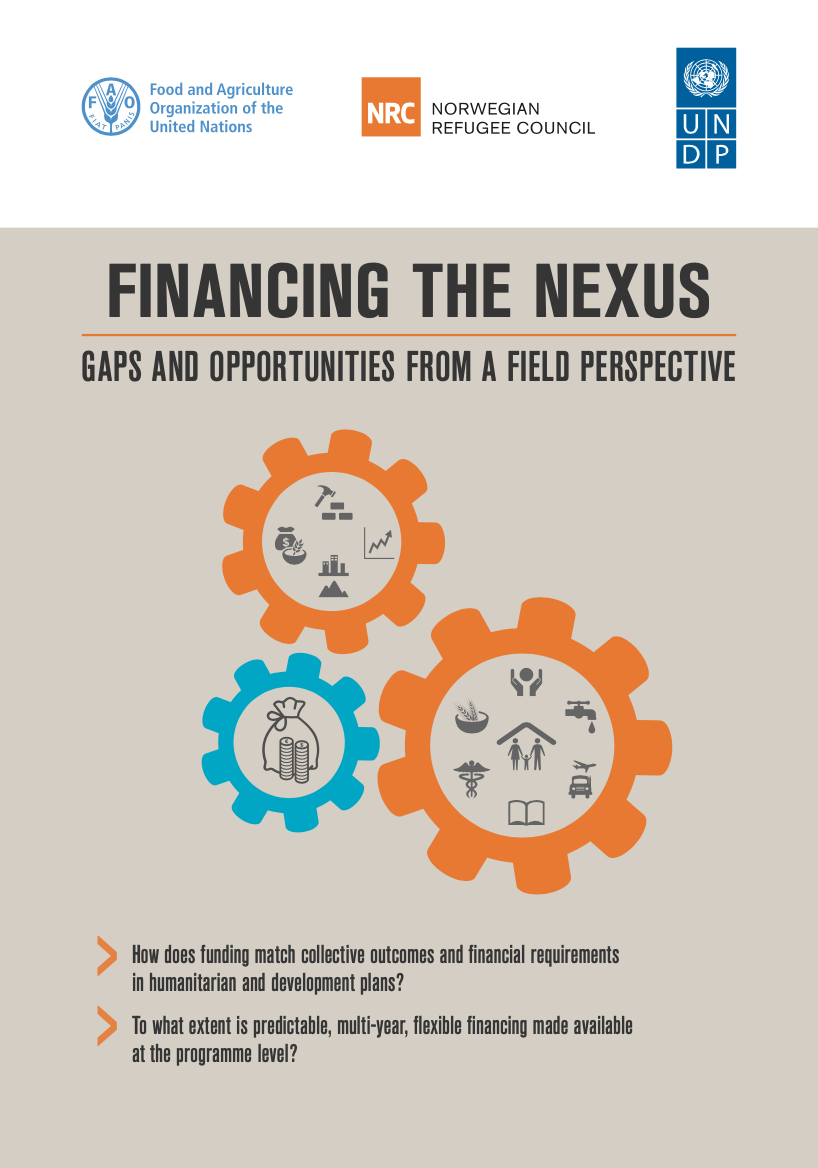
This study contributes to the Inter-Agency Standing Committee (IASC) humanitarian financing priorities of improving “aid effectiveness through more effective humanitarian- development funding flows and mechanisms”. It has two goals: to document the extent to which predictable, multi-year flexible financing is available at the programme level; and to understand the extent to which funding matches Collective Outcomes or the financial requirements of interoperable humanitarian and development plans.
Humanitarians inherently work in places of high fragility, conflict, or instability. These characteristics both define where humanitarian action is needed and impact the ability of humanitarian actors to accomplish their mission of reducing human suffering.
The humanitarian imperative requires humanitarian organizations to accept a culture of risk in order to operate effectively in such environments. While a high level of risk acceptance is embedded in the culture of humanitarian work, corresponding use of risk management tools is not yet embedded in the culture of many humanitarian NGOs. It is critical for NGOs to understand how to better identify and manage risk to improve their ability to respond effectively in humanitarian crises.
To work toward this objective, ICVA’s e-learning stream on “Risk” (2019-2021) facilitates dialogue among humanitarian stakeholders on how to improve application of risk management approaches and tools. The series includes a number of briefing papers and webinars focused on a range of topics: risk and organisational culture, risk appetite and tolerance, security risk management, and staff well-being, among others.
The theme of ICVA’s Annual Conference 2020 was “Protecting principled humanitarian action: An honest conversion on risk” . Check out the recording and conference report.
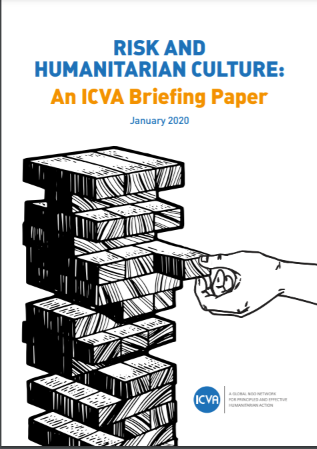
This briefing paper examines the current risk landscape in humanitarian aid.
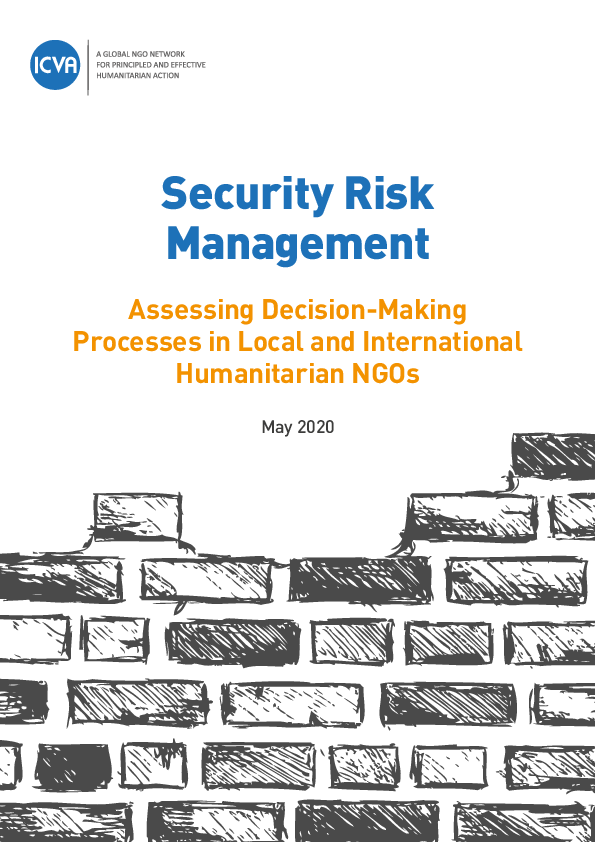
Security Risk Management
Assessing Decision-Making Processes in Local and International Humanitarian NGOs
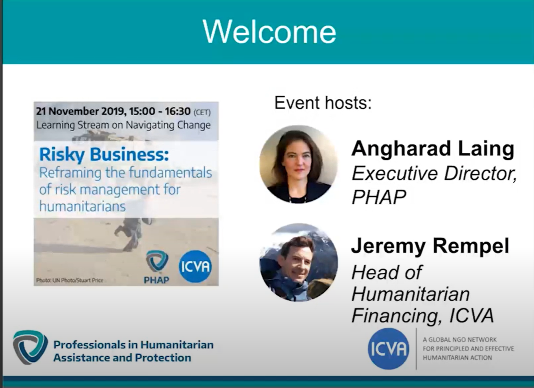
Risk awareness is something that is embedded in the culture of humanitarian work but risk management is not. Therefore, it is critical for NGOs to understand how to identify and manage risk. This learning stream provides a platform for the NGO community to share their current practice, discuss, and learn from one another in order to better understand how to manage risks when working in the humanitarian sector and apply it in their day-to-day work.
This series includes webinars on the following topics:
ICVA has partnered with DisasterReady to make free online learning resources available for humanitarian aid and development professionals to better understand how to apply risk management best practices in their daily work. Partnerships are a key component for improving the efficiency and impact of humanitarian action. Many international aid organizations rely on national partners and actors to implement programs and deliver assistance to people and communities affected by crisis, especially in areas with limited humanitarian access.
What you will learn:
1. Risk Management in Practice Course
2. Risk Management and Funding Partnerships Course
Click on the below link to access the courses.
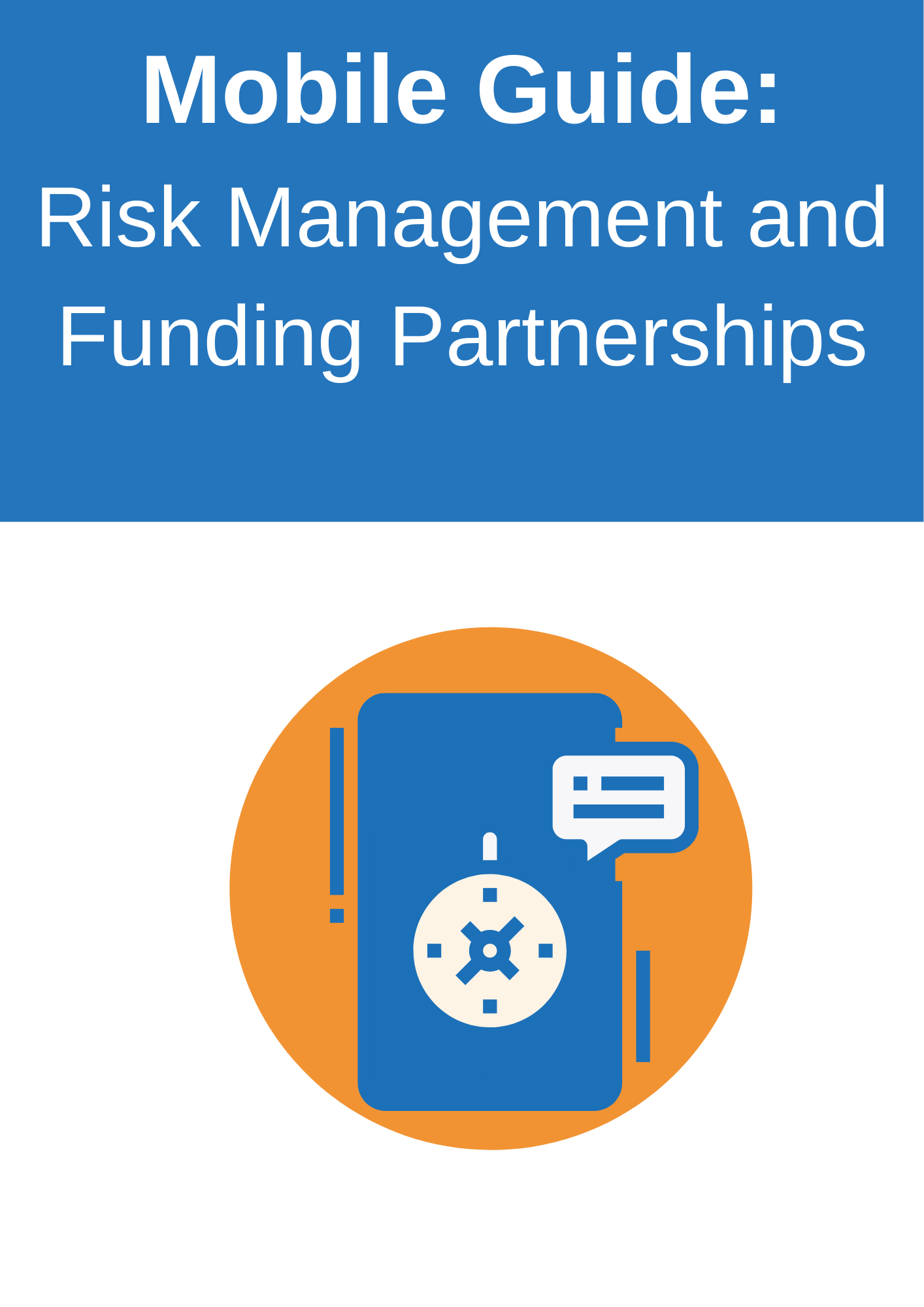
The International Council of Voluntary Agencies (ICVA) has partnered with DisasterReady to make free online learning resources available for humanitarian aid and development professionals to better understand how to apply risk management best practices in their daily work. Partnerships are a key component for improving the efficiency and impact of humanitarian action. Many international aid organizations rely on national partners and actors to implement programs and deliver assistance to people and communities affected by crisis, especially in areas with limited humanitarian access. Risk management:
What you will learn:
1. Risk Management in Practice Course
In this 10-minute course, you will learn how to apply risk management best practices in humanitarian response. This resource provides guidance on understanding risks, defining your organization’s risk universe, key steps in the risk management process, and embedding risk management in your organization.
2. Risk Management and Funding Partnerships Course
In this 10-minute course, you will learn best practices for managing operational challenges and risks affecting funding partnerships in the humanitarian sector. This resource provides guidance for applying risk management practices to select and engage with partner organizations in programs that are funded by external donors.
Both courses come with a downloadable PDF for offline use and works great on a smartphone, tablet, or computer.
How to register
To access this free, online training resource go to DisasterReady.org to create your free account, log in, and search for “Risk Management in Practice” and “Risk Management and Funding Partnerships.”
The
The CBPF Resource Facility, hosted by ICVA, is designed to empower local and national NGOs (L/NNGOs) by enhancing their capacity and participation in OCHA Country-Based Pooled Funds (CBPF) governance structures at both global and national levels.
Supported by multiple donors, and in partnership with the OCHA Pooled Fund Working Group (PFWG) and the CBPF NGO Dialogue Platform Advisory Group (PAG), this initiative provides essential financial and technical support to L/NNGOs. The Resource Facility ensures these NGOs can effectively engage in CBPF governance mechanisms, participate as members of Country-Based Pooled Fund Advisory Boards, and attend PFWG meetings globally. Through this collaboration, we strive to amplify the voices of L/NNGOs, acknowledging their vital contributions to humanitarian efforts.
CBPF-NGO Dialogue Platform has been an important forum to improve NGO engagement with OCHA on Pooled Funds.
Country Based Pooled Funds (CBPFs) are a valuable mechanism used by donors to pool their contributions to support country specific humanitarian efforts. These funds can be allocated directly to local NGOs, to support donor’s localization objectives. ICVA aims to develop a more systematic approach to identify how to improve participation of national NGO partners, and how to improve NGO access to and use of pooled funds.
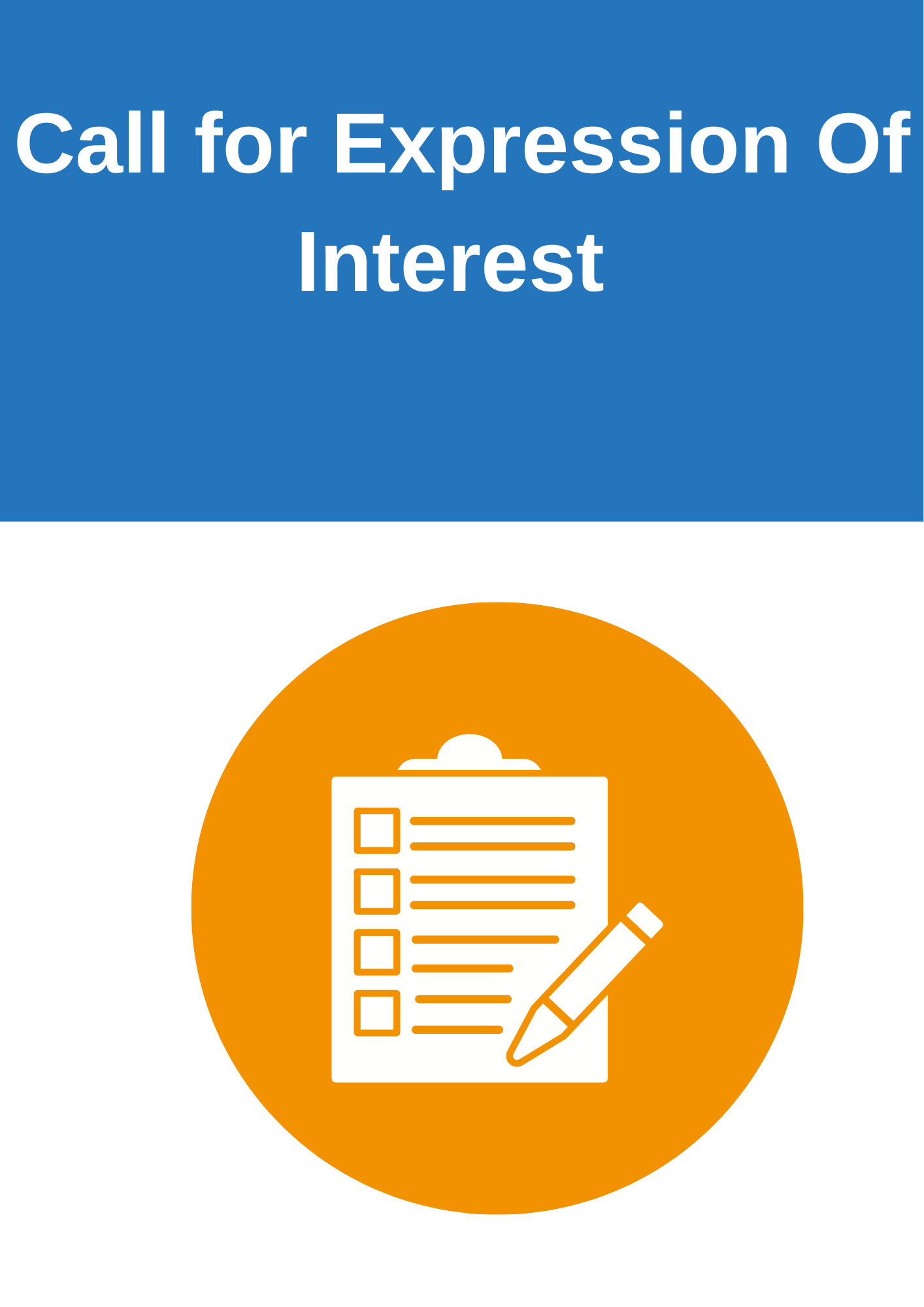
OCHA and Save the Children, co-chairs of the CBPF-NGO Dialogue Platform, are now accepting expressions of interest for the new round of members of the Platform Advisory Group (PAG) and a new NGO co-chair of the CBPF-NGO Dialogue Platform.
Find more information in the below link.
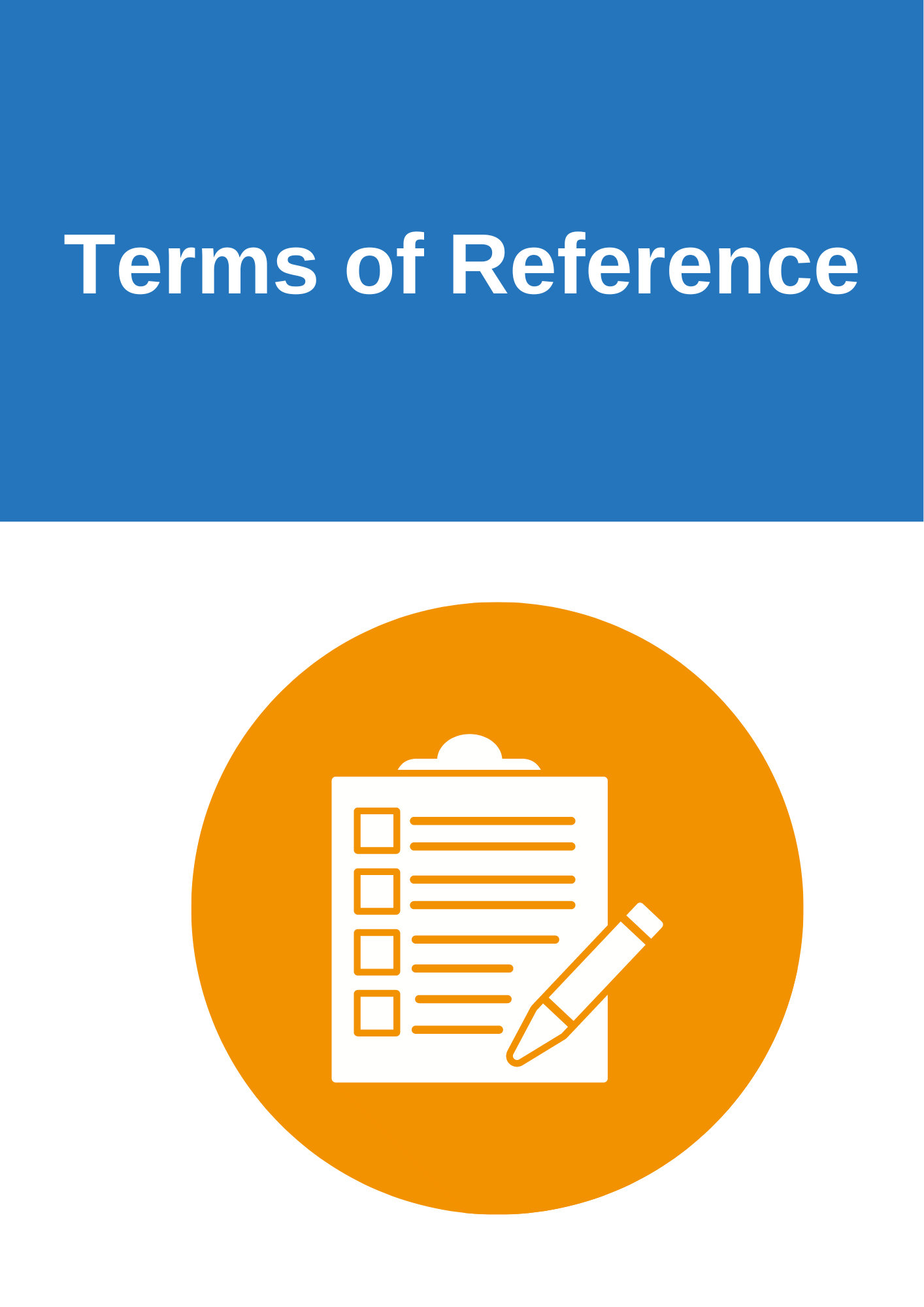
The Platform Advisory Group (PAG) provides advice for OCHA and the NGO co-chair of the OCHA CBPF-NGO Dialogue Platform, with a primary goal of fostering an open and all-encompassing platform for regular dialogue between OCHA and NGOs. This dialogue aims to inform strategic direction and facilitate efficient management of CBPFs. PAG members also assume the role of designated NGO representatives in the Pooled Fund Working Group (PFWG), which consists of representatives of donors and UN agencies, acting as the principal advisory body for OCHA’s management and leadership of Country-based Pooled Funds.

The OCHA Country-based Pooled Fund (CBPF)-NGO Dialogue Platform, or simply the Platform, aims to foster an open and inclusive forum for regular communication between OCHA and the NGO community in order to inform the strategic direction and management of CBPFs. The creation of the Platform was prompted by the desire of NGO partners to establish a robust partnership with OCHA regarding CBPFs, and to enhance the communication between OCHA and NGOs at the country level.
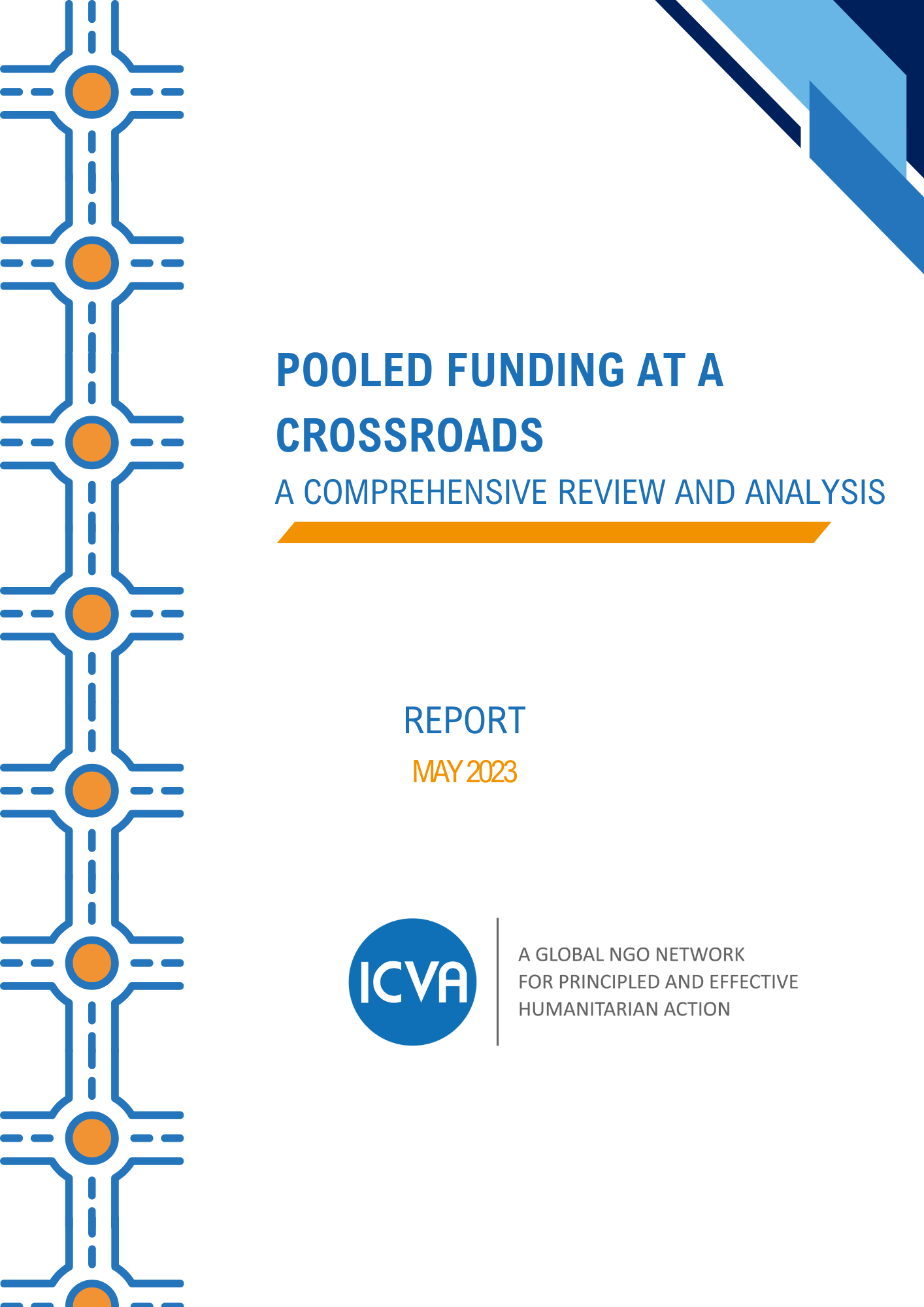
Pooled funding has become increasingly popular as an efficient solution to enhance effectiveness of humanitarian action. The Covid-19 Global Humanitarian Response Plan organized through IASC is an example of pooled funding being used to channel funds faster to frontline humanitarian responders. Contributions to the OCHA-managed pooled funds have seen a steady growth since 2011-2012, drawing increased attention and examination into their impact and potential. A review of existing literature explores the strengths and weaknesses of pooled funds in terms of effectiveness, efficiency, innovation, learning, knowledge sharing, and achieving broader policy objectives.
The review highlights potential gaps in the literature that could be explored by ICVA and its membership while also identifying future trends relevant for ICVA’s research, advocacy, and policy agendas.
Click on the below link to read the review.
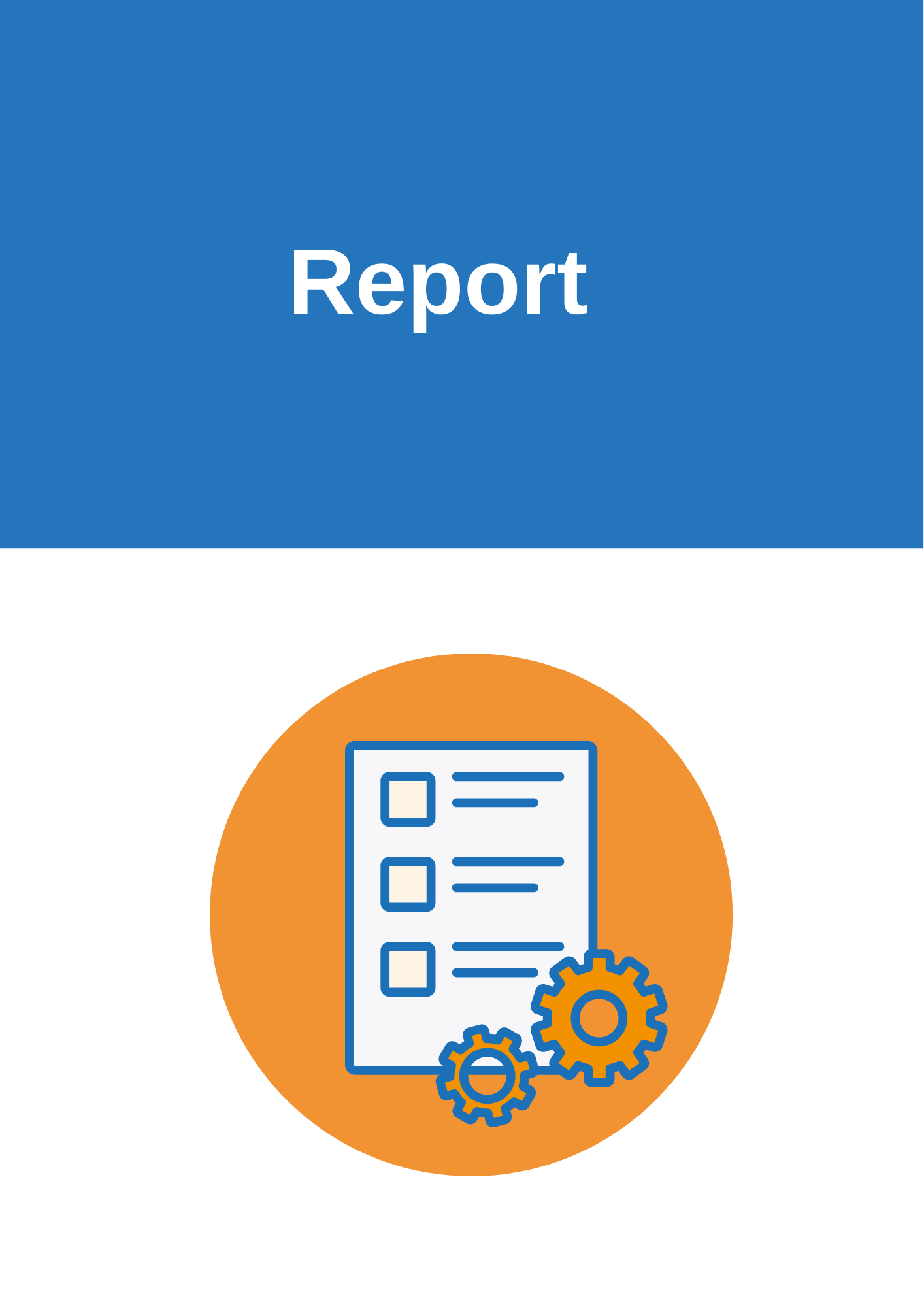
This report presents the key findings and recommendations from a lessons learned exercise after the first year of the operation of the RHFWCA in Niger and Burkina Faso. Conducted from September 15th to November 15th, the exercise included consultations with key stakeholders including Humanitarian Coordinators (HCs), donors, Advisory Boards (ABs), inter-cluster coordination groups (ICCGs), and registered partners/sub-partners, as well as a review of data collected from the Grant Management System (GMS). The exercise was facilitated by a joint team from OCHA’s Regional Office for West and Central Africa (ROWCA) and the Pooled Fund Management Branch (PFMB) at headquarters (HQ).
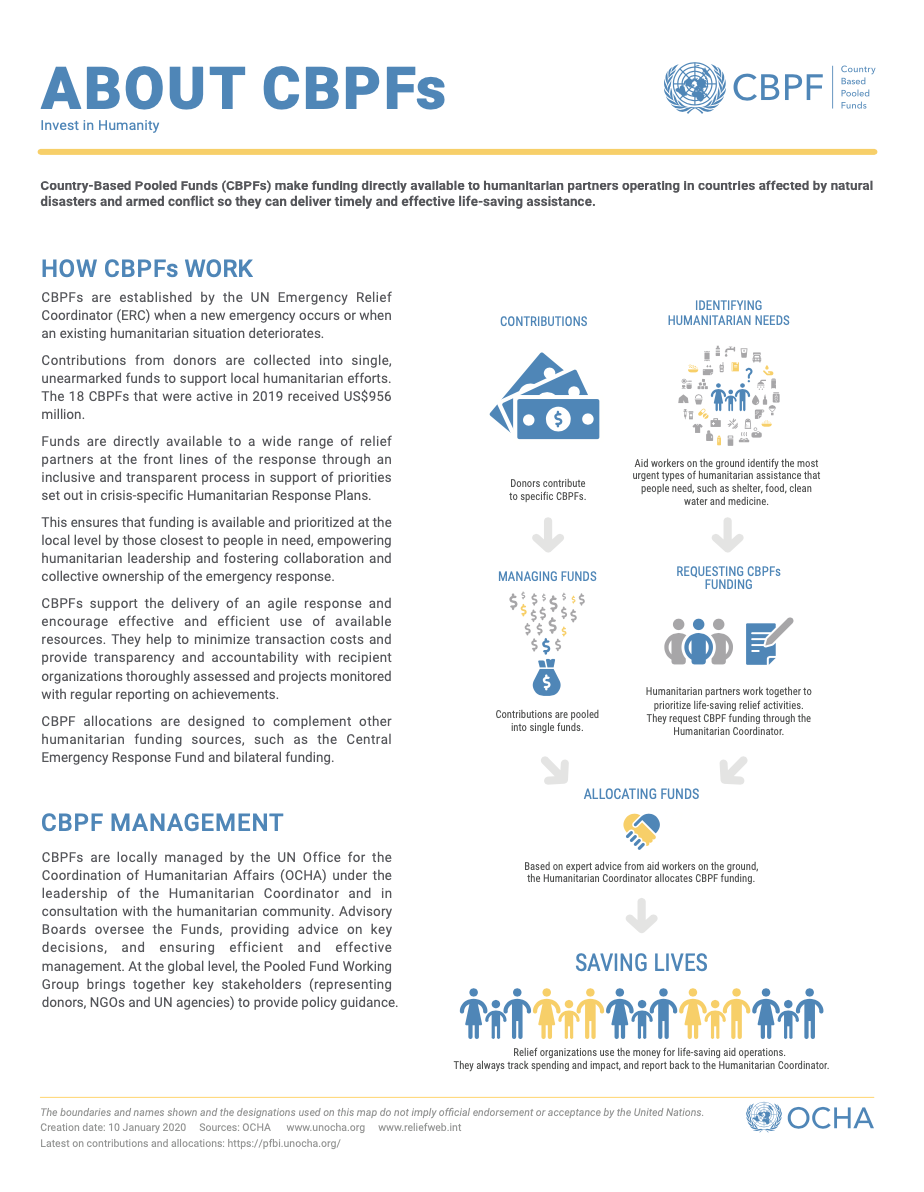
CBPFs are established by the UN Emergency Relief Coordinator (ERC) when a new emergency occurs or when an existing humanitarian situation deteriorates.
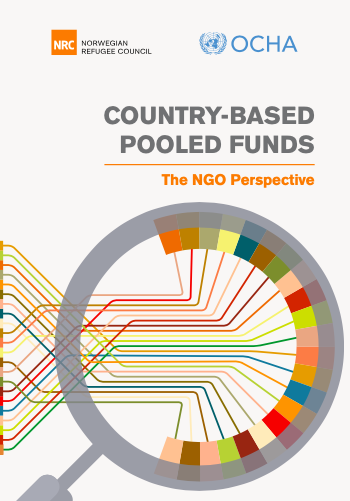
The study also builds on NRC’s 2017 report, Understanding Humanitarian Funds. It endeavours to determine whether NGOs still feel CBPFs are fit for purpose, particularly in terms of Grand Bargain commitments to reduce the earmarking of donor contributions, increase multi-year disbursements and improve local and national humanitarians’ access to funding. It also discusses ways to reduce the administrative burdens on recipient organisations, and governance and decision-making issues.
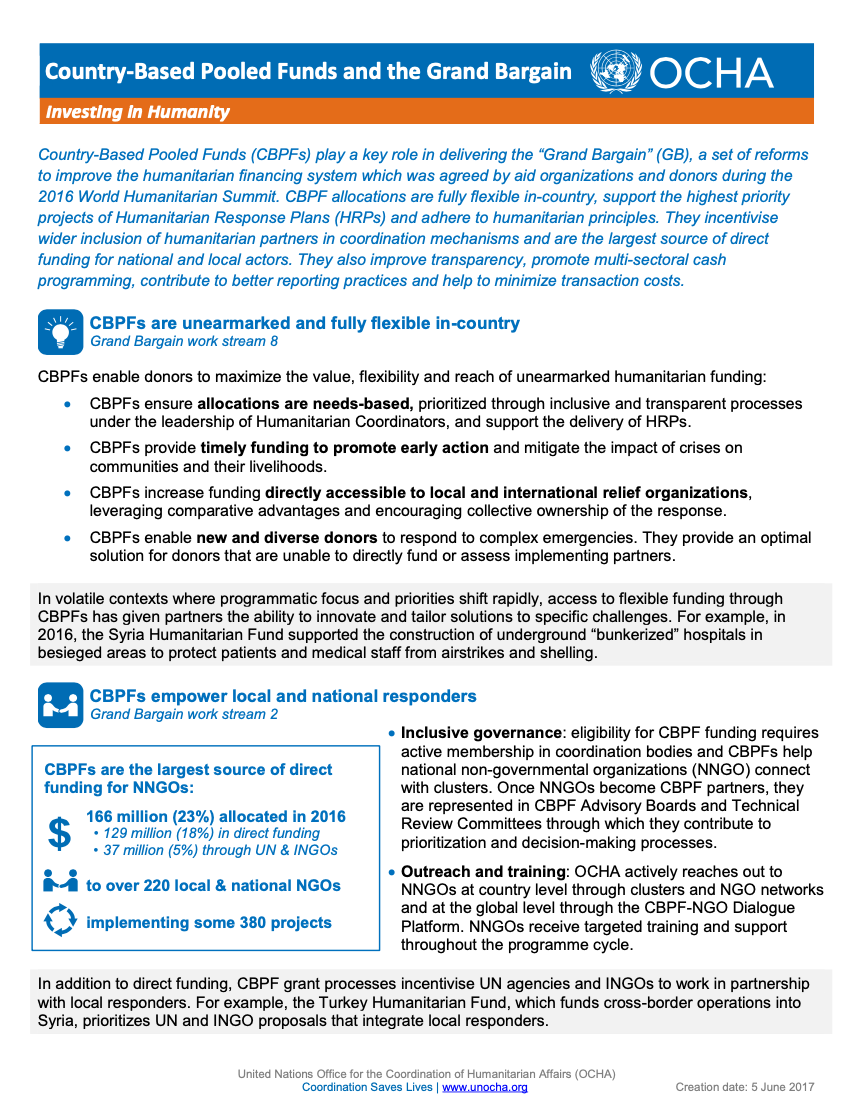
Country-Based Pooled Funds (CBPFs) play a key role in delivering the “Grand Bargain” (GB), a set of reforms to improve the humanitarian financing system which was agreed by aid organizations and donors during the 2016 World Humanitarian Summit.
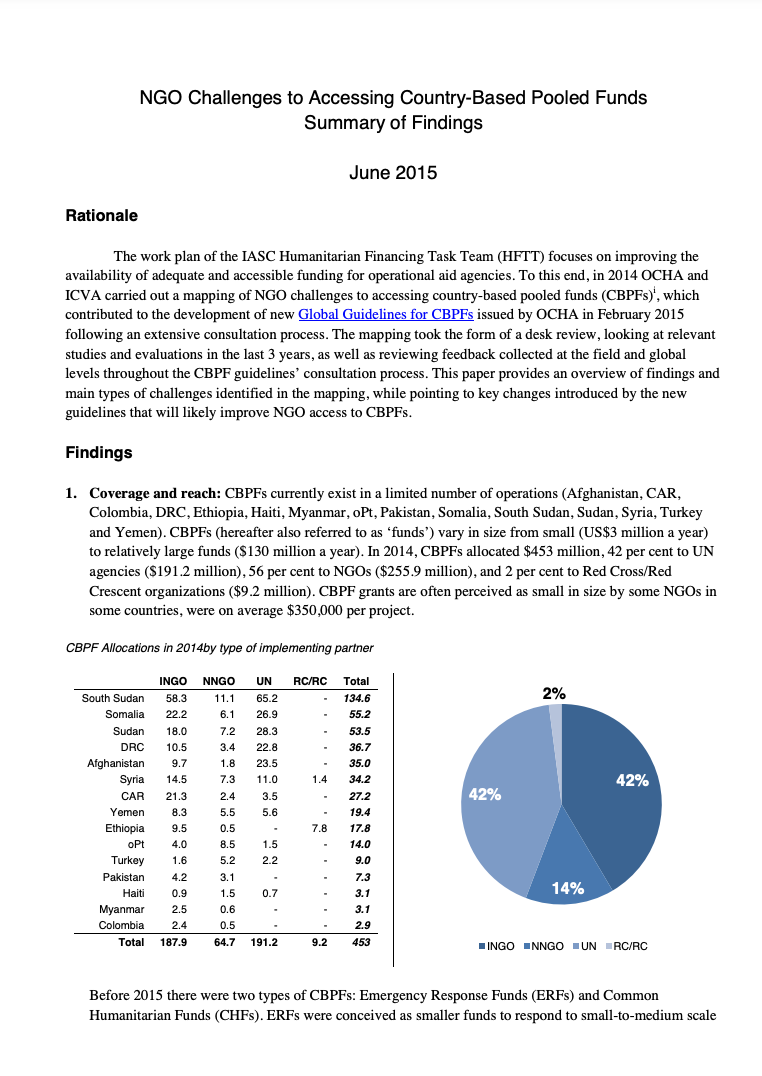
The work plan of the IASC Humanitarian Financing Task Team (HFTT) focuses on improving the availability of adequate and accessible funding for operational aid agencies. To this end, in 2014 OCHA and ICVA led a mapping of NGO challenges to accessing country-based pooled funds (CBPFs), which contributed to the development of new Global Guidelines for CBPFs issued by OCHA in February 2015 following an extensive consultation process.
The CBPF Resource Facility, hosted by ICVA, is designed to empower local and national NGOs (L/NNGOs) by enhancing their capacity and participation in OCHA Country-Based Pooled Funds (CBPF) governance structures at both global and national levels.
Supported by multiple donors, and in partnership with the OCHA Pooled Fund Working Group (PFWG) and the CBPF NGO Dialogue Platform Advisory Group (PAG), this initiative provides essential financial and technical support to L/NNGOs. The Resource Facility ensures these NGOs can effectively engage in CBPF governance mechanisms, participate as members of Country-Based Pooled Fund Advisory Boards, and attend PFWG meetings globally. Through this collaboration, we strive to amplify the voices of L/NNGOs, acknowledging their vital contributions to humanitarian efforts.

National NGOs working in humanitarian contexts are key stakeholders in the OCHA Country-Based Pooled Funds (CBPFs) mechanisms. To ensure their voices are heard, interested donors, the Pooled Fund Working Group (PFWG), the CBPF NGO Dialogue Platform Advisory Group (PAG), and ICVA have together launched the CBPF Resource Facility. The Resource Facility supports NNGOs’ effective participation in CBPF country and global governance processes, through both supporting participant costs to attend meetings and providing mentorship to boost the impact of their voices.
Click on the below links to access the Terms and Conditions document in English, French, Spanish and Arabic.

Risk awareness is something that is embedded in the culture of humanitarian work but risk management is not. Therefore, it is critical for NGOs to understand how to identify and manage risk. This learning stream provides a platform for the NGO community to share their current practice, discuss, and learn from one another in order to better understand how to manage risks when working in the humanitarian sector and apply it in their day-to-day work.
This series includes webinars on the following topics:
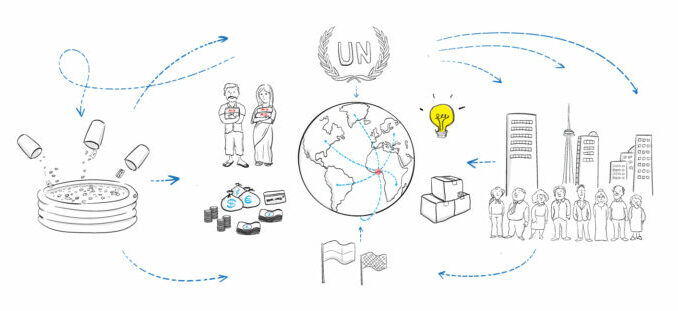
The 2016 ICVA learning stream on demystifying humanitarian financing is a series of webinars, videos and briefing papers to help NGOs better understand the various humanitarian financing mechanisms, influence policy related to humanitarian financing, and access funding.
Topics included in the webinar series include:

ICVA is a global network of non-governmental organisations whose mission is to make humanitarian action more principled and effective by working collectively and independently to influence policy and practice.
International Council of Voluntary Agencies
NGO Humanitarian Hub,
La Voie-Creuse 16, 1202, Geneva, Switzerland
Email: secretariat@icvanetwork.org
A curation of monthly updates, latest news, tools, and events around forced migration, coordination, financing, and cross cutting issues all sent straight to your inbox.